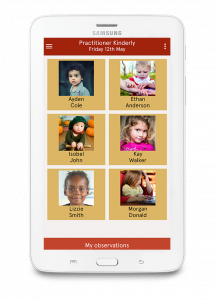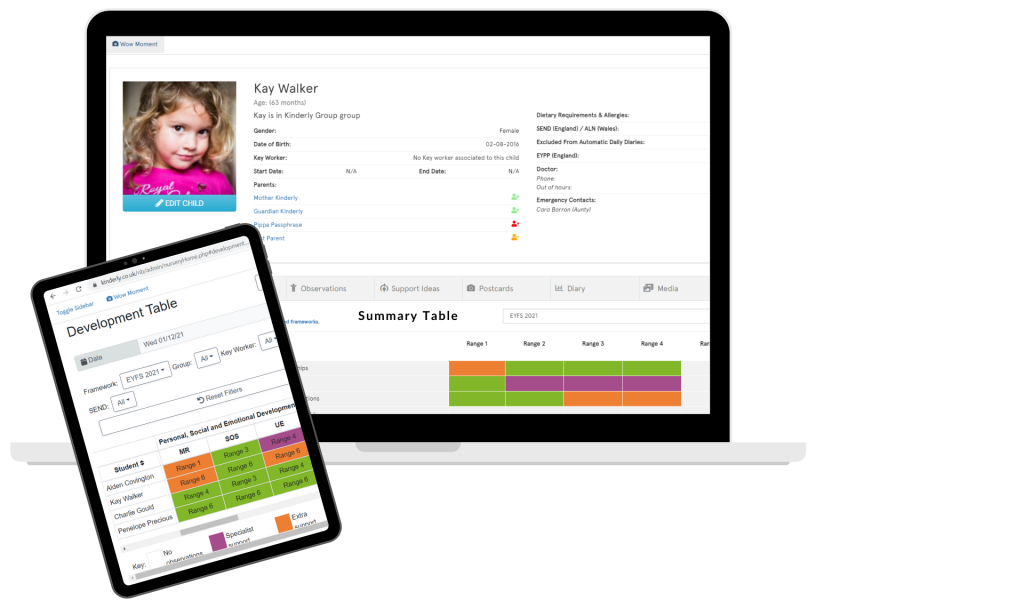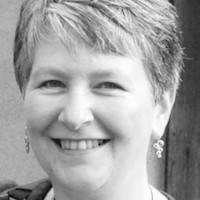In September 2019, Ofsted replaced the current ‘Common Inspection Framework’ with the ‘Education Inspection Framework’ or EIF. The new framework sets out how Ofsted will now approach and conduct inspections in the various phases of education it regulates, including the Early Years.
The advent of the EIF has caused much concern and consternation as people get their heads around new terminology and concepts, such as ‘cultural capital’, with myths and misinformation already circulating widely about what Ofsted are and are not looking for.
My aim here is to share the knowledge I have gained and dispel some of the concerns people have about the EIF. I also want to discuss the potential impact of the EIF on those using digital technology to support their practice, including online systems that record observations, child development and support parent engagement, for example, Kinderly Together.
I want to look in more detail at some of the points above and dispel some of the myths I’ve seen arising from these.
Yes, you can.
Although within the EIF there is no requirement for any written form of learning and development records, except for the progress check at age 2, they can be a valuable and useful way of sharing information about a child with other practitioners, settings, parents and inspectors, as well as the children themselves.
Consider using digital systems, such as Kinderly Together, which contains time-saving tools, including ways of creating observations, uploading photographs and recording information, that are quick and efficient.

Think about the purpose of each record you are creating: who is it for; why are you noting a particular observation. Do it because it benefits the child, don’t do it for Ofsted!
The Education Inspection Framework and accompanying Early Years Inspection Handbook (DfE, 2019) make it very clear that inspectors must not ask for any documentation that is not an EYFS requirement. This means that inspectors should not ask to see any learning and development records, such as learning journals, except the statutory progress check at age 2.
The inspector will expect you, and any staff, to have excellent knowledge of the children in your care. They will want to discuss their starting points, interests and strengths; what you are working on with them now and how you will build on this. You can use an online learning journal like Kinderly Together, to support this conversation and provide additional evidence.

The new judgement area ‘Quality of Education’ brings together the former areas of ‘Quality of Teaching’ and ‘Outcomes’. The focus in this judgement is on putting the ‘curriculum at the heart of the new framework’.
Ofsted have broken down ‘Quality of Education’ into three aspects, sometimes referred to as the ‘three ‘I’s’:
These terms may be new but the idea behind them is not. We already have the planning cycle of ‘plan, observe, assess’ from the EYFS and some of you may be familiar with the ‘plan, do, review’ system from Highscope.
Intent: based on my knowledge of this child, what do they need to learn, know or be able to do, in the context of the areas of learning and development and characteristics of effective learning (the curriculum) in order to succeed in life (cultural capital)? What is needed to support them to achieve this?
Implementation: how I deliver my plans: e.g. through teaching and modelling; discussion; providing resources and experiences, so the child will make progress in areas of learning and development
Impact: how do I know if what I planned was successful; that the child has achieved the outcomes? What can they do they could not do before, or what new knowledge do they have?
Expect the inspector to ask you about the ‘three Is’ for the activities and resources you have on offer.
The joint observation activity will still take place but there is no longer a requirement to plan a specific activity to be observed.
The inspector will be looking for quality interactions between children and any adults. Expect to be asked about the intent, implementation and impact of the activity being observed.
No, cultural capital is a sociological term adopted by Ofsted and defined by them as: “The essential knowledge that children need to prepare them for their future success’’
Ofsted say: ‘Some children arrive at an early years setting with different experiences from others, in their learning and play. What a setting does, through its EYFS curriculum and interactions with practitioners, potentially makes all the difference for children. It is the role of the setting to help children experience the awe and wonder of the world in which they live, through the seven areas of learning’.
It is essential that you get to know your children and families well. Information can be gathered through the starting points/baseline assessments. Continue to capture and share experiences and activities with 2-way communication with parents. E.g ‘Postcards from home’ on Kinderly Together.
Cultural Capital – Example activities
Keep up to date with key information and changes relating to the new Ofsted EIF by signing for a free trial on Kinderly Learn.
A big focus within the new framework, which has close links with cultural capital, is developing children’s communication and literacy, and closing the ‘word gap’. Recent research has highlighted that there is still a massive gap between the number of words heard by under 5s from disadvantaged backgrounds and those from more advantaged families; around one million words. We know that having a broad vocabulary and strong communication skills have a major impact on children’s long-term outcomes. It is important that you and any staff role-model good language skills yourselves and that you include daily, frequent opportunities for conversations and discussions with children that promote critical thinking and problem solving.
Since the Early Years Inspection Handbook was published in 2019 there have been a number of revisions, including those made to reflect adjustments to inspections during the Covid-19 pandemic and subsequent disapplications of parts of the EYFS.
From September 2022 an updated Early Years Inspection Handbook will come into force.

About Rebecca – Early years consultant, trainer and Ofsted Registered Childminder
Passionate about learning and strongly believes in the value of child-led play.
Rebecca is also Outreach and Training Co-ordinator for the West Sussex charity – Reaching Families, the co-founder of Minding the Gap CPD and is Kinderly’s resident ‘expert’ on the Kinderly Learn platform.